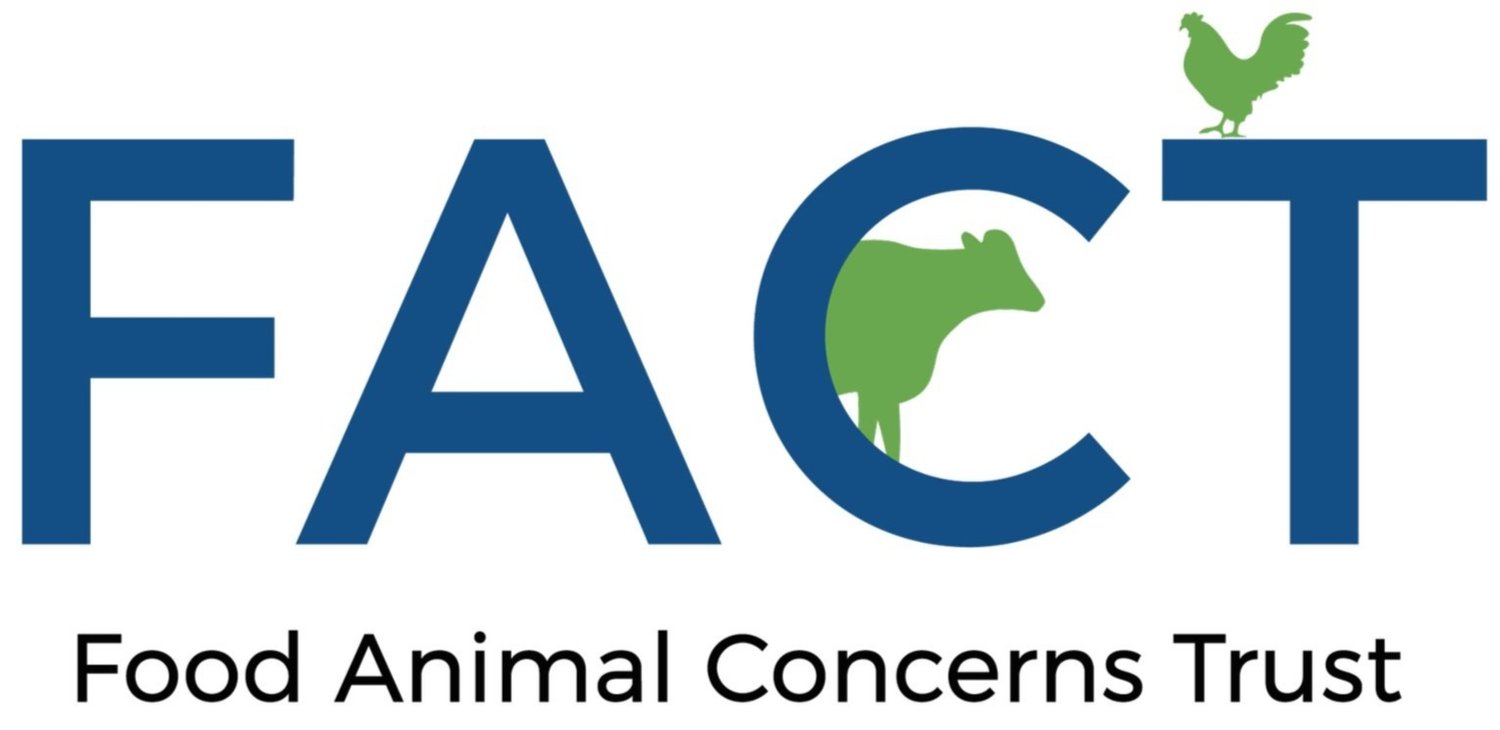
Fighting for a
Carbadox-Free World
Help keep carcinogens out of foods and improve the lives of pigs!
FACT has been committed to the health and well-being of people and animals raised for food for over 40 years. Through educating farmers and consumers we hope to ban the use of cancer- causing carbadox in the pork industry. And you can help!
Carbadox, a feed additive commonly given to piglets which the FDA is actively trying to ban, has been shown to damage genes and elevate the risk of cancer in humans who eat pork given carbadox. We encourage you to take the Carbadox Free Commitment and purchase pork only from pastured pork producers and farmers who guarantee their animals are carbadox free and raised without routine antibiotics! And please read the resources below and spread the word about this dangerous drug.
What is carbadox?
Carbadox is a feed additive used to control diarrhea and promote growth in pigs living in confinement.
Carbadox is a known carcinogen which as of November 7, 2023, the FDA is proposing to withdraw from the market.
When the drug is fed to pigs it breaks down into smaller chemicals, some of which are also carcinogenic. These chemicals can remain in pork tissue when the pig is slaughtered, leading to an increased cancer risk in people who eat the pork products.
Carbadox is dangerous for food workers handling the drug.
Carbadox and its metabolites have been found polluting surface waters, posing risks to the environment.
Carbadox contributes to antibiotic resistance.
Carbadox is estimated to be used in at least 50% of the 70 million pigs raised for food each year in the US.
The FDA proposed a ban on the drug in 2016, but pushback from the industry stalled efforts and the proposal didn’t go anywhere. In 2023, the FDA in an effort to push the ban forward has officially withdrawn the method used to detect carcinogenic residues in food and ensure consumer safety because it is not sensitive enough to find all of the residues present. As stated above, the FDA has also proposed a new ban on the drug.
Despite the insensitivity of the current method, residues of carbadox are found year after year in USDA random sampling. See our latest report for more detail.
The drug is already banned in many of the top pork producing countries including China, the European Union, the United Kingdom, Australia, Canada, Brazil, Japan, and Uruguay.
Why is carbadox used?
Carbadox is commonly used in factory farming conditions where disease spreads easily and piglets are weaned before their digestive systems are developed enough for solid foods. Here are some major differences between pigs raised on pasture vs factory farms. These contribute significantly to the use of carbadox and other antibiotics as well.
Factory Farms:
Weaned early when they’re not ready for solid foods
Taken from their mothers early and shipped to factory farms
Very little sunlight or fresh air
Raised in confined, crowded environments where stress is high and disease spreads easily, suppressing the immune system
Carbadox is used to treat swine dysentery, a horrible disease often spread because crates and animal housing are not thoroughly disinfected and cleaned after an outbreak, and new young pigs are introduced to disease-ridden environments
Thin skin that can be damaged by other pigs biting and scuffs from metal bars and metal enclosures
Fed a high-energy diet
Pasture based:
Weaned when they’re ready for solids
Placed on pasture
Plenty of fresh air and sunlight (a natural disinfectant)
Ample room to move around and exercise muscles - leading to less stress
Improved immunity and ability to weather the natural environment
Thick skin
Consume grass and pasture
For more information read the “humane standards”
How to avoid carbadox?
Buy from your local farmer and ask them directly if they use a medicated starter feed containing carbadox
Buy meat raised without routine antibiotics or organic products
The majority of pasture-based systems don’t use medicated pig feed containing carbadox
Check back for updates on farms within our network that have made a carbadox-free commitment
FACT’s work on carbadox:
FACT has written asking the FDA to ban the drug and has asked fast food companies, pork processors, and more recently food distribution companies to prohibit the use of the drug in their pork supply. So far, the companies have not acted.
Recently, FACT published an eye-opening report on residues of carbadox. Our new report and analysis of USDA residue data has found that every year over 6,500 roaster pigs and 390,000 servings of pork likely contain dangerous residues of the carcinogenic pig drug carbadox.
We recently delivered a petition with over 2300 signatures calling on the FDA to stop delaying and to ban carbadox now. Thank you everyone who signed. FACT and our supporters have been pushing to get carbadox banned for years, and in November, 2023, the FDA published a proposal to withdraw carbadox from the market. This is huge news! While the company will almost certainly fight back to keep the drug’s approval, a process which could take some time, this is a giant step forward. See our latest comments in response to the FDA’s proposal to withdraw carbadox.
Still want to learn more? Check out these resources:
An opinion editorial in STAT news by our Executive Director, Harry Rhodes
Article from the Counter
Reconsidering relevance of carbadox - Study with quote: “In swine production, carbadox can be used in conjunction with other antibiotics (e.g., oxytetracycline) that could fuel the emergence of strains carrying phage-encoded resistance determinants.”
Have questions about carbadox or how to start raising your animals without it? Contact Steve Roach or Samantha Gasson
Be on the lookout for more farmer specific resources soon!



